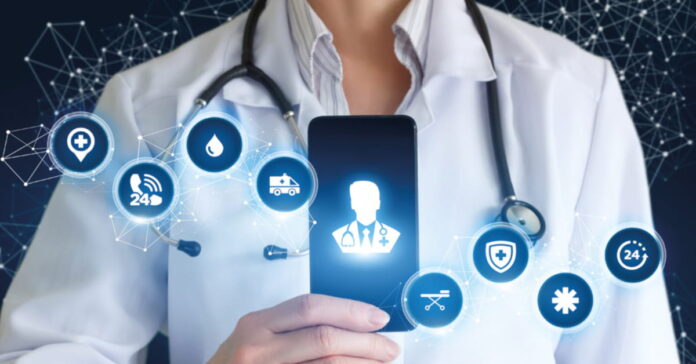Over the years, mobile health has become more innovative. Medical professionals are now integrating mobile healthcare apps into their practices and using them to execute their duties. Developers aren’t lagging; they are building medical apps that address numerous issues faced by healthcare. Undoubtedly, mobile apps have grown extensively and are expected to grow in the coming years.
This article will cover mobile medical application development’s past, present, and prospects. At the end of this article, developers will have better insights on how to build a medical app that can help solve issues facing healthcare.
The Past
BlackBerry was the preferred device for medical professionals until the arrival of the iPhone in 2007. A year after the iPhone launched, it made its Software Development Kit (SDK). SDK developed and launched a wave of interest in medical software. In 2009, the first version of Air Strip, an iPhone app that delivered fetal heart rate monitoring in real-time, was launched. Since then, medical applications have taken a considerable leap and continued to grow and expand.
The Present
Today, mobile medical apps are becoming more popular among patients and medical professionals. A survey done by UnitedHealthcare revealed that more people are increasingly embracing medical apps and healthcare technology. The survey also showed that 37% of respondents had used mobile medical applications compared to 14% in 2012.
Deloitte also did several surveys which show that there has been a rise in the adoption of virtual visits since 2018. 80% of consumers, especially the younger generations, would choose to have a virtual visit again.
Another aspect of mobile medical application development that has experienced growth is the patient’s willingness to share their data, especially since the COVID-19 pandemic. Patients now prefer to use mobile medical apps, virtual care services, and virtual care channels for basic health services. Some of the things that mobile medical applications are now able to do include:
– Contributing to the provision of integrated care.
– Making healthcare services more affordable and accessible.
– Reducing the risks of duplicate medical errors and records by offering access to data shared by patients in real-time.
– Allowing patients to have more control over their health by allowing them to monitor their health data and accessing their doctors when necessary.
Future Prospects
The future of mobile medical app development is bright (click here for the relevant Topflight Apps study). This is because mobile health apps will continue to improve and multiply in the coming years. There will be a better relationship between web-based and native applications. App stores will also continue to flourish. According to surveys done by Esferasoft, some of the future trends observed by mobile medical app developers include:
– 93% of medical professionals find value in connecting mobile health apps to Emergency Health Services
– More people (Up to 61%) will download and use mobile medical apps.
– 31% of surveyed companies provide a precise medical app for patients, while 30% of the organizations are building a health app.
This data shows that the prospects of medical applications are massive. Other mobile medical application development prospects are the Internet of Medical Things (IoMT) and Blockchain. So, we cannot undervalue medical applications. Shortly, they will contribute significantly to managing physicians’ medical duties.
Want to Know How to Build a Medical App?
Several developers now build healthcare applications. And the reason is simple: Mobile healthcare apps will significantly help to improve the healthcare field. Mobile healthcare apps are currently monitoring health conditions, helping to avoid catastrophic health diseases, and monitoring rehabilitation.
With the issues facing the medical field, such as the absence of fixed security standards, mobile health apps are a crucial part of the future of healthcare. Mobile health reduces costs and enhances medicine’s quality. This benefits all stakeholders and users, making healthcare more accessible. So, if you know how to build a medical app, several solutions you can provide will contribute to the future of healthcare.
Final Thoughts
The future of mobile medical app development is secured. This is because healthcare developers are building more medical apps targeted at making healthcare more efficient and effective. As a developer interested in making mobile apps in healthcare services, you must ask yourself some questions. These include: What challenges is the medical field facing? Which solutions have been provided, and how effective are these solutions? The answers to these questions will give you a clear insight into how to build a medical app that works!
Read Also
- Optimizing CT Protocols: The Hidden Key to Efficiency and Cost Savings in RadiologyIntroduction: Why CT Protocol Optimization Matters Computed Tomography (CT) is a cornerstone of modern diagnostic imaging, providing critical information across nearly every medical specialty. However, maximizing the value of CT — both clinically and financially — requires more than just advanced hardware. The real secret lies in the optimization of CT protocols. When CT protocols… Read more: Optimizing CT Protocols: The Hidden Key to Efficiency and Cost Savings in Radiology
- The Role of Carbide Burs in Modern Dental ProceduresAs a result of this procedures need to be well coordinated and to this end, precision tools are used by dental practitioners. Among the most essential tools in a dentist’s arsenal are carbide burs, which have revolutionized various aspects of dental work. Today’s dentistry cannot work without these tools as they are both strong, sharp,… Read more: The Role of Carbide Burs in Modern Dental Procedures
- Detection of Diabetic Retinopathy: The AI AdvantageDiabetic retinopathy (DR) is a leading cause of blindness among working-age adults, affecting millions worldwide. The prevalence of DR is alarmingly high, affecting an estimated 34.6 million people globally. In the United States alone, it is estimated that 7.7 million adults have some form of diabetic retinopathy. How Does Diabetes Affect the Eye? Most of… Read more: Detection of Diabetic Retinopathy: The AI Advantage
- Advances in Digital Health: Transforming Modern HealthcareThe healthcare landscape is undergoing a seismic shift with the advent of digital health technologies. These innovations are not just modern conveniences; they are transformative tools that bridge gaps in accessibility, improve patient outcomes, and empower individuals to take charge of their health. From wearable devices to telehealth and artificial intelligence, digital health is creating… Read more: Advances in Digital Health: Transforming Modern Healthcare
- The Latest Advancements in Urology ProceduresUrology, the branch of medicine concerning the urinary system and male reproductive organs, has seen remarkable advancements in recent years. Technological innovations have led to more precise, less invasive, and increasingly successful procedures that promise better outcomes for patients. From state-of-the-art robotics to personalized medicine approaches, the field of urology is evolving at a rapid… Read more: The Latest Advancements in Urology Procedures






